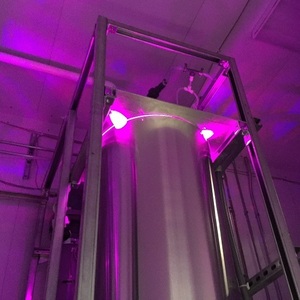PHYCO2, MSU make wastewater reusable through pure algae growth

Photo: PHYCO2
February 10, 2017
BY PHYCO2
PHYCO2 LLC, an emerging algae production, waste water treatment and carbon dioxide sequestration company, announced the successful treatment of wastewater from breweries to comply with state water discharge limits for nitrates and phosphates. During Phase 4 of the multiyear trial with Michigan State University, the research of sequestering CO2 for algae growth has shown that PHYCO2’s algae photobioreactor (APB) can be utilized to treat wastewater through algae growth and cultivation. The treated water can also be reused in the brewery operations.
MSU and PHYCO2 found that the APB can successfully grow pure microalgae with both CO2 emissions from a power plant and from the absorption of nitrates and phosphates from wastewater. Both found in fermentation and distillation manufacturing plants (e.g., breweries, wineries, and spirits company operations). PHYCO2’s APB allows pure microalgae to grow indoors, 24 hours a day, in any geographic location and at any time of the year. The algae developed contained 49 percent protein content and 15 percent lipid content.
Advertisement
Advertisement
Wei Liao, MSU associate professor and director at the Anaerobic Digestion Research and Education Center in the Department of Biosystems & Agricultural Engineering, and advisor to PHYCO2’s testing program, noted “The PHYCO2 APB showed remarkable results in terms of long-term production with minimum maintenance, high algae growth rates and productivity, and good control of biofouling in the APB. The high-quality algae produced by the reactor can also be used as a chemical feedstock for human and animal nutrition, biostimulants, biopolymers, and other high-value applications where a sustainable feedstock are desired.”
Previous phases of the trials showed success in sequestering CO2 emissions via algae growth. Built inside MSU’s T.B. Simon Power Plant, PHYCO2’s APB absorbs CO2 emissions directly from the plant, creating high-density pure algae cultivations that can be used for a multitude of products. Within the first round of testing, the two-month period showed algae density, absorption and productivity rates higher than the algae and production rates found at recently reported studies.
Advertisement
Advertisement
”The PHYCO2 APB and test program worked well with our plant operations and we were very pleased with the results that used the CO2 from our plant exhaust to grow algae,” said Dan Bollman, MSU assistant vice president for infrastructure planning and facilities. “The ability to also treat wastewater opens a new area of research and development that are consistent with the university goals of sustainable and implementation of green technologies in our campus programs.”
“Wastewater is a major concern for manufacturers, our governments, and everyday citizens,” said PHYCO2 CEO William Clary. “This new technology allows manufacturers to tackle this issue head on, and the pure microalgae can then be used for a multitude of everyday products, from lipstick to ice cream to gasoline and feed.”
The studies conducted at MSU with PHYCO2’s APB represents the growth and development of future environment saving technology that truly is market sustainable, allowing MSU to continue to be at the forefront of cutting-edge research and development. The collaboration is a direct response to the current CO2 emission and wastewater concerns of manufacturers across the globe.
Related Stories
The USDA’s National Agricultural Statistics Service on June 30 released its annual Acreage report, estimating that 83.4 million acres of soybeans have been planted in the U.S. this year, down 4% when compared to 2024.
SAF Magazine and the Commercial Aviation Alternative Fuels Initiative announced the preliminary agenda for the North American SAF Conference and Expo, being held Sept. 22-24 at the Minneapolis Convention Center in Minneapolis, Minnesota.
Scientists at ORNL have developed a first-ever method of detecting ribonucleic acid, or RNA, inside plant cells using a technique that results in a visible fluorescent signal. The technology could help develop hardier bioenergy and food crops.
The 2025 International Fuel Ethanol Workshop & Expo, held in Omaha, Nebraska, concluded with record-breaking participation and industry engagement, reinforcing its role as the largest and most influential gathering in the global ethanol sector.
TotalEnergies and Quatra, the European market leader in the collection and recycling of used cooking oil, have signed a 15-year agreement beginning in 2026, for the supply of 60,000 tons a year of European used cooking oil.
Upcoming Events










